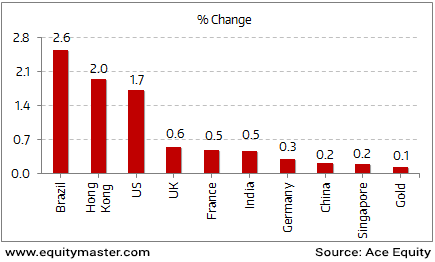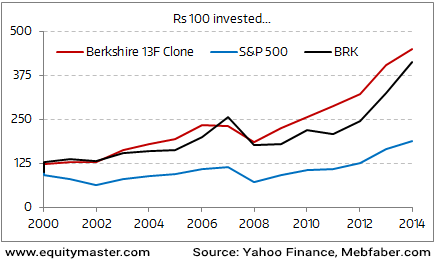Cloning Warren Buffett
- In this issue:
- » India's Ecommerce Ponzi Scheme Unravels
- » The Curious Case of Bank Deposits Post Notebandi
- » The Week's Market Update
- » ...and more!
00:00 Chart of the Day

I clone my mentors. I copy everything they do, and then I innovate on top of it. - Henry Markram.
Warren Buffett's performance as a stock picker and business manager is par excellence. The numbers speak for themselves. The man has trounced the benchmark big time over the past five decades.
Now, what if we could tap into Buffett's stock picks and mimic his portfolio? And what if we didn't have to pay a cent for the privilege?
Well, the Securities Exchange Commission (SEC) requires all institutional investment managers with more than $100 million in assets under management to file Form 13F every quarter. Form 13F asks for positional level details of all securities the firm has invested in.
The catch is that these details are filed online after a delay of 45 days from the end of every quarter.
Berkshire Hathaway latest Form 13F was filed for the December 2016 quarter. The top ten holdings form almost 80% of Berkshire Hathaway's public investments.
| Berkshire Top 5 Holdings (%) | Dec-16 | Sep-16 |
|---|---|---|
| Kraft Heinz Co. | 19.2 | 22.6 |
| Wells Fargo and Co. | 17.9 | 16.5 |
| Coca Cola | 11.2 | 13.1 |
| International Business Machines | 9.1 | 10.0 |
| American Express | 7.6 | 7.5 |
Now, starting in, say, 2000, if you decided to mimic Berkshire's top ten holdings to form a group...and rebalanced, added, and sold every quarter based on Buffet's SEC disclosures...how would you have done at the end of fifteen years?
In his book, Invest with the House, Meb Faber did precisely this exercise. Here are the results: The cloned group of stocks returned 10.5% compounded annually compared to 4.3% for the more volatile S&P 500.
Berkshire Hathaway Clone Beats the S&P 500
While we don't have similar disclosure requirements in the Indian market - and therefore can't employ the same strategy - we still learn a very important lesson from this approach.
Stock picks of these smart minds available in the public domain could act as a basic yet effective first level filter towards identifying some great businesses. Not to mention they could be potentially rewarding as well.
The Art and Science of Cloning
Mohnish Pabrai, famed value investor and managing partner at Pabrai Funds, is a big believer in cloning. However, he has a slightly different take on it. He seeks to learn from the processes of respected value investors rather than just blindly copy their actions.
We agree: Learning and mastering the philosophies of respected value-style investors can give us a long-term edge. The key here is to go beyond the stock picks of these smart minds and understand their thought process behind buying them.
The Ponzi scheme of India's ecommerce companies has begun to unravel. Vivek Kaul is of the view that the endgame will witness an ecommerce bloodbath. Aditya Puri, Managing Director of HDFC Bank too joins in. He raised pertinent questions on the viability of the loss making payment app. Paytm. After the central bank gave licenses to set-up new payment banks. There has been intense competition among existing e-wallet companies to garner mind share of its customers.
It is a battle of survival. One among these e-wallets is the company Paytm. Riding high after the recently announced notebandi by the government. The company is going all out to get people habituated to using its application. Further, armed with a license to set-up a payments bank. It seeks to expand its offerings to its customers i.e. an ability to accept customer deposits would lower their cost of funds and provide a huge boost to them.
The current loss of Paytm is over Rs 16 billion. According to the Economic times, Puri reportedly said:
- There is no money in the payment wallets business. Payment wallets have no future. There is not enough margin in the business for wallets to have a future.
We think the competition to grab customer share will definitely cause pressure on margins of wallet companies. Once consolidation sets in, lower margins could act as a strong entry barrier for any potential new entrant to come into the business. However, will these ecommerce companies survive the endgame?
A unanimous expectation of everyone post Notebandi was that bank lending rates would come down. This has happened to some effect. However, the lending rates for the banks have fallen much less than the bank deposit rates. In his recent Diary, Vivek Kaul throws some light on interlinkages between deposit rates, lending rates and bank fixed deposits.
- As the Economic Survey points out: "By December 2016 the gap between the average term deposit rate and the average base rate had grown to 2.7 percentage points, from 1.6 percentage points in January 2015."
The question is why have the banks done this? Over the longer term, the banks have been trying to make up for their bad loans by doing this. As the Economic Survey points out: "They have tried to compensate for the lack of earnings from the non-performing part of their portfolio by widening their interest margins."
Over the short term, they are simply doing this because of the surfeit of deposits that have come in. They have invested this money in government securities (a large part), which do not pay a high rate of return like lending that money out would. To compensate for this, the banks have cut interest rates on their fixed deposits faster than the interest rates on their loans. Hence, notebandi or demonetisation has led to lower interest rates on fixed deposits.
This also shows that despite having money to lend. Banks are unsure on growing their lending book for the fear of further bad loans. We think robust economic growth rests squarely on the revival of credit growth in India. Further, banks play an important role in a smooth transmission of this credit growth across the country. Any hesitancy from the banks to lend could thus spell trouble for the already fragile economy.
04:25 When Good Gains Disappoint
18.24% in 19 days...
15.79% in 6 days...
11.15% in 10 days...
Impressive?
Well, for most traders they are indeed. Probably for you too.
But for Apurva, they're disappointing. Now don't get me wrong. This is not a case of sour grapes. These are actual returns he generated for his Swing Trader subscribers.
Apurva's disappointed because he knows there's a way to score even higher returns. Yes, Apurva has a proven process that could seal even higher returns.
He has revealed this process in his special report, How to Boost Trading Profits in Four Easy Steps. It's worth Rs 950, but you can download it for free.
I've been told that more than 4,000 readers signed up to download this guide in less than 48 hours of its release.
Don't miss it. Download now.
Most of the global markets ended the week on a positive note. The Brazilian index registered a 2.6% growth over the week, making it the top gainer. Indices in Hong Kong (up 1.9%) were among the top gainers for the week as positive cues from the US markets lifted the Asian markets. European markets closed on a flattish note. A host of strong economic data across various countries and hopes that US President Donald Trump would take measures that will boost US economic growth helped to support global indices.
US Markets (up 1.7%) continue to see new highs, as Donald Trump reinforced news regarding a major tax reform coming soon in the US. Trump is looking forward to lower the tax burden on corporates. The US markets have rallied by almost 8% since Trump's victory in the elections. Meanwhile, Federal Reserve Chairwoman Janet Yellen appeared to reinforce the market's optimism when she testified in front of the Senate Banking Committee that investors are expecting a more growth-supportive fiscal policy and a boost corporate earnings, increase infrastructure spending. Janet Yellen also said the U.S. central bank could raise interest rates as soon as next month.
Among developed economies, all European indices closed on a slightly weaker note in contrast to the rally earlier in the week. The UK indices closed the week up by 0.6%, while the German and French indices ended the week on a flattish note with gains of 0.3% and 0.5% respectively.
Back home, the BSE-Sensex ended in green and was up 0.5%. The week started on a positive note with some dull streaks over the week amid quarterly result updates announced by major companies. Favorable results from most companies kept the markets buoyant. On the other end Tata Motors reported a 96% fall in net profit in its quarterly result update, leading to a steep fall in its share price. Tata motors stock fell by 11% over the week.
Meanwhile, HDFC Bank's share price rallied handsomely over RBI's decision to allow FII investments in the bank. However, the stock pared much of its gains as the RBI had to reinstate the restriction after the FII investments reached the stipulated cap. HDFC bank's stocks rallied over 5% in the week.

04:55 Today's Investing Mantra
"You only have to do a very few things right in your life so long as you don't do too many things wrong." - Warren Buffett
This edition of The 5 Minute WrapUp is authored by Rohan Pinto (Research Analyst).Today's Premium Edition.
Today being a Saturday, there is no Premium edition being published. But you can always read our most recent issue here...
Recent Articles
- All Good Things Come to an End... April 8, 2020
- Why your favourite e-letter won't reach you every week day.
- A Safe Stock to Lockdown Now April 2, 2020
- The market crashc has made strong, established brands attractive. Here's a stock to make the most of this opportunity...
- Sorry Warren Buffett, I'm Following This Man Instead of You in 2020 March 30, 2020
- This man warned of an impending market correction while everyone else was celebrating the renewed optimism in early 2020...
- China Had Its Brawn. It's Time for India's Brain March 23, 2020
- The post coronavirus economic boom won't be led by China.
Equitymaster requests your view! Post a comment on "Cloning Warren Buffett". Click here!
1 Responses to "Cloning Warren Buffett"



KD
Feb 18, 2017Markets are inefficient in long term. Most of the very rich people seldom chase money. In our culture, there is the concept of MAYA. Contrary to western belief, the concept of MAYA says more desperate you become to earn money, the less you will get. Same is true with investing.